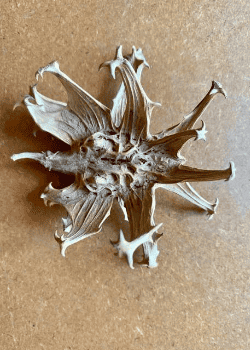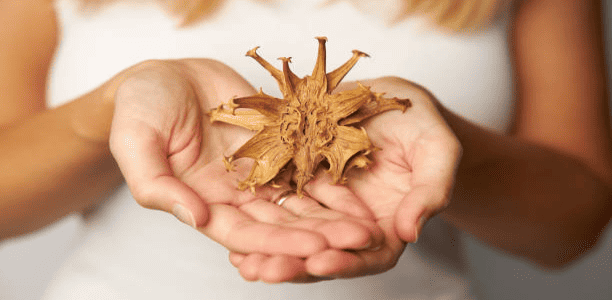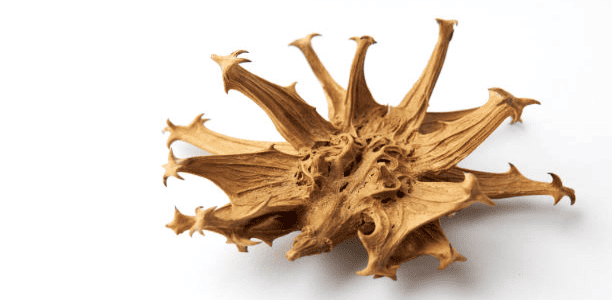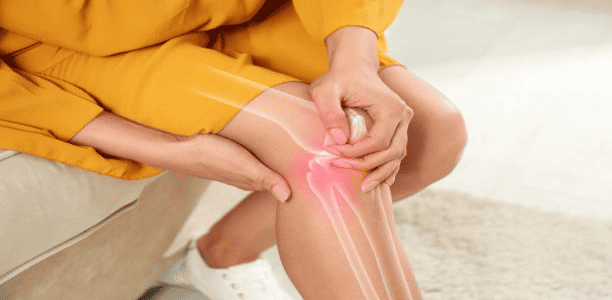
Let's analize Devil’s Claw for arthritis – is it reliable for relieving pain?
In this article, we're going to explore its main benefits.
Besides, let's discuss its results when it comes to arthritis and joint pain.
Trust me, this article will help you figure out whether this herb is suitable for you or not.
Note: This article includes references and studies on Devil’s Claw.
Devil’s Claw Good For Arthritis? (In A Nutshell)
First of all – Devil's Claw is a herb native to Southern Africa.
It's believed to help with several health issues, but most commonly with arthritis.
Now – its major bioactive compound is called harpagoside.
According to a few studies, it has anti-inflammatory properties and an analgesic effect.
So with that – here are its main potential benefits:
- supports a better health in a lot of aspects
- alleviates pain-related arthritis and other types of pain
- has an anti-inflammatory potential
- helps reduce cell damage, due to its antioxidants
As you can see in this article, we highlighted the effect of this herb on arthritis.
To give you an idea, it offers protection to the bones and cartilage.
Consequently, it has a helpful effect in the long run:
- prevents further deterioration caused by arthritis
- allows connective tissues to act as joint cushions
But take note that as of the moment, most research is based on the topical use of the herb.
Also – keep in mind that the research on its internal use is very limited.
That especially is if you compare it to other herbs with a similar effect (turmeric, boswellia or ginger).
Still – Devil's Claw is helpful in relieving mild to moderate pain only.
That's not too bad, since its benefits are real.
But again – don't expect that it's as strong in reducing pain as other herbs.
Overall, remember not to use it as a sole treatment for arthritis.
It's definitely not a cure, since its effect isn't very strong.
What Is Devil’s Claw?
Let's start this article by listing down some general aspects about Devil's Claw [1]:
- it's scientifically known as Harpagophytum procumbens
- most of its supply come from Southern Africa
- it comes from the Sesame seed family called Pedaliaceae
- is widely known for its pain relieving and anti-inflammatory properties
Additionally – this plant received the name “Devil's Claw” due to its unique appearance.
As you can see in the photo below, it resembles a hand with hooked extensions.
It has several pharmaceutical properties, but the most popular one is its potential to treat pain symptoms in conditions like [2]:
- arthritis
- gout and tendonitis
- digestive problems
- myalgia and fibrositis
Now – its major active compound is called harpagoside.
It works by inhibiting the activation of inflammatory pathways and stimuli (COX-2 and lipoxygenase) [3].
Also – Devil's Claw has analgesic effects and it offers cartilage protection.
With that, let's further highlight the main benefits of this herb when it comes to arthritis.
#1 – Alleviates Arthritis
Firstly – let's going to discuss the effects of Devil's Claw on arthritis.
As we all know, this health condition is pretty specific [4]:
- symptoms include stiffness and inflammation of the joints
- causes swelling and redness in the affected areas
- persists over time and requires an ongoing management
Now – let me summarize the common types of arthritis:
- osteoarthritis – caused by age and joint injuries
- rheumatoid arthritis – an autoimmune disease
- gout – produced by accumulation of uric acid crystals in the joints
So what does Devil's Claw have to do with those problems?
Well – it has the ability to improve and protect the destructed bone and cartilage [5].
In this way, the connective tissues can act as cushions for the joints.
This would prevent the further complications specific to arthritis .
Even so, there are still very limited studies regarding its full efficacy in managing arthritis.
Still, let's not invalidate Devil's Claw, since it has potential – it just needs more research.
#2 – Manages Pain
As mentioned above, arthritis is a chronic problem.
For this reasons, it comes with several painful symptoms (mostly in the joints) [6]:
- warmth and redness
- striking pain and swelling
- reduced movement and mobility
- fever, headache and nausea
Again – Devil's Caw has anti-rheumatic and anti-inflammatory benefits.
Additionally, it possesses analgesic properties (the ability to relieve pain).
The key player behind is its iridoid glycosides content – most especially its harpagoside [7].
All these substances suppress the production of pain mediators, thus lowering the pain sensation.
But unlike anesthesia, Devil's Claw doesn't alter sensory awareness [8].
Also – it doesn't block nerve impulses and consciousness.
If you're on painkillers, you should be careful when it comes to take Devil's Claw.
There could be some possible interactions between those drugs and the herb.
But honestly, it's not the most potent pain-relieving herb (it mostly works for mild to moderate pain).
It can surely help, but it's not as strong as turmeric or Boswellia.
#3 – Fights Inflammation
Another notable potential of Devil's Claw is its antioxidant and anti-inflammatory potential.
As I mentioned, it can reduce the actions of the stimuli and pathways involved in inflammation [9].
Now, here are some inflammatory health issues this herb might help with [10]:
- acne, psoriasis and dermatitis
- arthritis and joint problems
- Inflammatory Bowel Disease (IBD)
But again – there's no strong research and clinical trials behind them.
As of the moment, we can only hope that it can contribute to the treatment.
Well – the good thing is, it's already been established that it has anti-inflammatory properties.
Now – since it's an herb, it's surely rich in antioxidants, because these substances are mostly found in plant foods.
They neutralize the free radicals in your body to avoid cell deterioration [11].
And according to science, Devil's Claw does have a high content of antioxidant compounds.
#4 – Supports Overall Health
Lastly – there are some herbalists who suggest that Devil's Claw can promote a better overall health.
It can help ameliorate the following problems [12]:
- appetite loss
- heartburn
- headaches and fever
- allergies and boils
- skin lesions and sores
- upset stomach and ulcers
- non-ulcer dyspepsia [13]
Now – these benefits are mostly applicable when you apply Devil's Claw topically.
That's because they can be attributed to the herb's analgesic effects.
So improving some health issues is not impossible, but lower your expectations.
Devil's Claw can be helpful for mild to moderate forms of arthritis pain.
However, there are still no definitive studies to back up those claims.
So overall – if you're looking for relief in some sort of light pain, you can try Devil's Claw.
But take note that there are stronger alternatives available, for more severe arthritis forms.
Final Conclusion
To sum it up – Devil's Claw can help with arthritis relief.

This would prevent the damage caused by arthritis.
Besides that, here are the other promising benefits of the herb:
- provides antioxidants
- has a strong anti-inflammatory effect
- reduces painful sensations
- improves overall health
Some of these benefits can be attributed to the herb's ability to inhibit inflammatory mediators.
Additionally – it's rich in antioxidants.
Lastly, there are very limited studies about its benefits and its mechanism of action.
Plus – it can only alleviate mild to moderate pain (not severe one).
At this point, it's only known as a topical product or as an ingredient of some arthritis creams/gels.
With that, we can conclude that it's not the best herb for pain and inflammation.
Sure – it does have a very helpful effect ,but it's not as strong as turmeric (the #1 anti-inflammatory herb).
1 – https://www.ncbi.nlm.nih.gov/-pmc/articles/-PMC9182060/
2 – https://www.sciencedirect.com/topics/-harpagoside/
3 – https://www.ncbi.nlm.nih.gov/-pmc/articles/-PMC5065736/
4 – https://www.cdc.gov/arthritis/-basics/types/-Arthritis/
5 – https://www.ncbi.nlm.nih.gov/-pmc/articles/-PMC9364518/
6 – https://www.healthdirect.gov.au/-arthritis/
7 – https://www.sciencedirect.com/-topics/-harpagophytum/
8 – https://www.sciencedirect.com/-topics/chemistry/-analgesic/
9 – https://pubmed.ncbi.nlm.nih.gov/-16203115/
10 – https://www.ncbi.nlm.nih.gov/-books/-NBK279298/
11 – https://www.sciencedirect.com/-science/-S0308814610001081/
12 – https://www.mountsinai.org/-health-library/herb/-devils-claw/
13 – https://onlinelibrary.wiley.com/-doi/-j.1365-2036.2002.01339/









